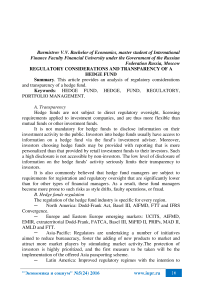Regulatory considerations and transparency of a hedge fund
Автор: Burmistrov V.V.
Журнал: Экономика и социум @ekonomika-socium
Статья в выпуске: 5-1 (24), 2016 года.
Бесплатный доступ
This article provides an analysis of regulatory considerations and transparency of a hedge fund.
Hedge fund, hedge, fund, regulatory, portfolio management
Короткий адрес: https://sciup.org/140124609
IDR: 140124609
Текст статьи Regulatory considerations and transparency of a hedge fund
PORTFOLIO MANAGEMENT.
-
A. Transparency
Hedge funds are not subject to direct regulatory oversight, licensing requirements applied to investment companies, and are thus more flexible than mutual funds or other investment funds.
It is not mandatory for hedge funds to disclose information on their investment activity to the public. Investors into hedge funds usually have access to information on a hedge fund via the fund’s investment adviser. Moreover, investors choosing hedge funds may be provided with reporting that is more personalized than that provided by retail investment funds to their investors. Such a high disclosure is not accessible by non-investors. The low level of disclosure of information on the hedge funds’ activity seriously limits their transparency to investors.
It is also commonly believed that hedge fund managers are subject to requirements for registration and regulatory oversight that are significantly lower than for other types of financial managers. As a result, these fund managers become more prone to such risks as style drifts, faulty operations, or fraud.
-
B. Hedge funds regulation
The regulation of the hedge fund industry is specific for every region.
-
─ North America: Dodd-Frank Act, Basel III, AIFMD, FTT and IFRS Convergence.
─ Europe and Eastern Europe emerging markets: UCITS, AIFMD, EMIR, extraterritorial Dodd-Frank, FATCA, Basel III, MiFID II, PRIPs, MAD II, AMLD and FTT.
─ Asia-Pacific: Regulators are undertaking a number of initiatives aimed to reduce bureaucracy, foster the adding of new products to market and attract more market players by stimulating market activity.The protection of investors is highly prioritized, and the first measure to be taken will be the implementation of the offered Asia passporting scheme.
-
─ Latin America: Improved regulatory regimes with the intention to
come into line with the G20 recommendations. For example, a higher percentage of adherence to Basel core principles than the developing markets of Asia.
─ Rest of the world: Many of the emerging markets such as Africa and the Middle East currently under extreme civil unrest, making the application of national and regional regulation extremely challenging.
Below the details of those regulations that are crucial for the asset management companyanalyzedwill be presented (with focus on hedge funds only).
-
1. Onshore hedge funds regulation
-
a. UCITS:
UCITS stands for Undertakings for Collective Investments in Transferable Securities. UCITS provides a single European regulatory framework for an investment vehicle which means that it is possible to market the vehicle across the EU without worrying which country it is domiciled in.
The appearance of the UCITS system has decreased the costs for fund providers since it was no longer necessary to build a new investment vehicle for each of the countries in which they planned to market the product.
-
b. AIFMD
-
2. Offshore hedge funds regulation
The Alternative Investment Fund Managers Directive (AIFMD) requires alternative assets managers located in Europe or elsewhere to increase operational transparency on behalf of regulators and investors, including, but not limited to more frequent and detailed reporting, disclosure of executives’ compensation.Like UCITS, AIFMD is a common supervisory framework aimed to fill in the regulatory gaps at the national level.
Transposing and implementation of the AIFM directive in France is considered to be one of the most successful. It appeared to be the key challenge for French investment funds, as more than 300 French asset management companies manage 8500 French AIFs with assets equal to €860bn.
The successful implementation of the directive in France was mainly due to the concerted and long effort of the French authorities and the overall industry. On the early stage of the legislative process, French asset management companies collaborated with French and European policymakers. The new directive was considered by these companies as an opportunity rather than a threat.As the French rules were 90% compatible with the AIFMD, few amendments to the existing rules in some jurisdictions were needed to make the current legal regime comply with the new directive.
An offshore fund is a term which generally refers to a collective investment scheme domiciled in an offshore jurisdiction. The popular traditional offshore jurisdictions for hedge funds’ corporate domicile are the Cayman Islands, Jersey or the British Virgin Islands, as well as Delaware, Luxembourg and Ireland.
As can be seen, hedge funds provide limited transparency to their investors owing to the absent direct regulatory control, relatively less rigid licensing requirements and low disclosure of information. At the same time, the first two factors enable hedge funds to be a more flexible investment vehicle than other investment funds. Nevertheless, the regulation of this sector becomes more stringent. Currently, the degree of strictness of the regulatory oversight depends on the geographical region under consideration.
"Экономика и социум" №5(24) 2016


